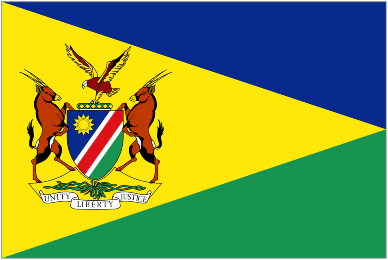ABOUT NAMIBIA
Official Name: Republic of Namibia
Capital: Windhoek
Official Language: English
Government: Republic (multi-party constitutional democracy)
President: H.E Nangolo Mbumba
Independence: 21 March 1990
Population (est. 2023): 3,022,401 Million
Population Growth Rate (2023) 1.45 %
GDP Nominal (2023): USD 12.70 Billion
GDP per Capita (2023): USD 4331
Main Exports: Fish, Mineral Ores, Diamonds, Uranium and Meat
Main Export Destinations: South Africa, Angola, Switzerland and EU
Inflation: (2023) % 7.2
Currency: Namibia Dollar (N$) = 100 cents
Time Zone: GMT+2h00
Dialing code: +264
Internet au: .na
President's Flag

The flag of Namibia's President represents the supreme authority of the head of state and chief executive and is flown to indicate his presence.
The flag is also flown on the President's car. The flag is rectangular with three triangles in the colours blue, gold and green. The gold is charged with the Coat of Arms.
The use of the President's Flag is restricted to Namibia. When the President travels to other countries only the National Flag is used. This means that only the National Flag can be flown in foreign countries to represent Namibia, while the President's Flag represents the status and authority of the President of Namibia.
Namibian National Anthem - Namibia,Land of the Brave
NAMIBIA land of the brave
Freedom fight we have won
Glory to their bravery
Whose blood waters our freedom
We give our love and loyalty
Together in unity
Contrasting beautiful Namibia
Namibia our country
Beloved land of savannahs
Hold high the banner of liberty
Chorus:
Namibia our country
Namibia motherland
We love thee.
National Flag

Namibia’s National Flag was unanimously adopted by the Constituent Assembly on 2 February 1990 as a symbol of the country’s struggle for national unity.
It symbolises peace, unity and common loyalty to Namibia. The National Flag represents the nation in every aspect. The sun symbolises life and energy.
The golden colour of the sun represents the warmth and the colour of the plains of the Namib Desert.
The blue symbolises the sky, the Atlantic Ocean, Namibia’s marine resources and the importance of rain and water. Red represents the Namibian people, their heroism and their determination to build a future of equal opportunity for all. White refers to peace and unity, while the green symbolises the country’s vegetation and agricultural resources.
National Coat of Arms

The National Coat of Arms is the official emblem of the Government service as a statutory body. The Coat of Arms is depicted on all official publications and stationery.
The National Flag is reproduced on the shield of the Coat of Arms. It is firmly anchored in the sand of the centuries old Namib Desert. On the headband above the shield is the fish eagle, representing the north and our country’s water resources.
The fish eagle has excellent vision and is thus also a
symbol of the farsightedness of our country’s leaders. The two Oryx antelope on either side of the shield are indigenous, specifically to the semi-arid parts of Namibia. They are renowned for their courage, elegance and pride. The Welwitschia mirabilis, rooted in the desert sand is a unique desert plant, a fighter for survival and, therefore, a symbol of Namibia’s fortitude and tenacity. The headband refers to the traditions of our people and the diamond shapes symbolise the importance of diamonds to the country’s economy.
The motto, Unity, Liberty, Justice enshrines the key principles embodied in the Constitution. Private bodies may not use the Coat of Arms without the express permission of the President.
CONTACT INFORMATION
Address: SHIS QI 9 conjunto 8 casa 11
Lago Sul 71.625-080 Brasília-DF Brazil
Phone: +55 (61) 3248-6274 / 7621
Email: info@embassyofnaibia.org.br




